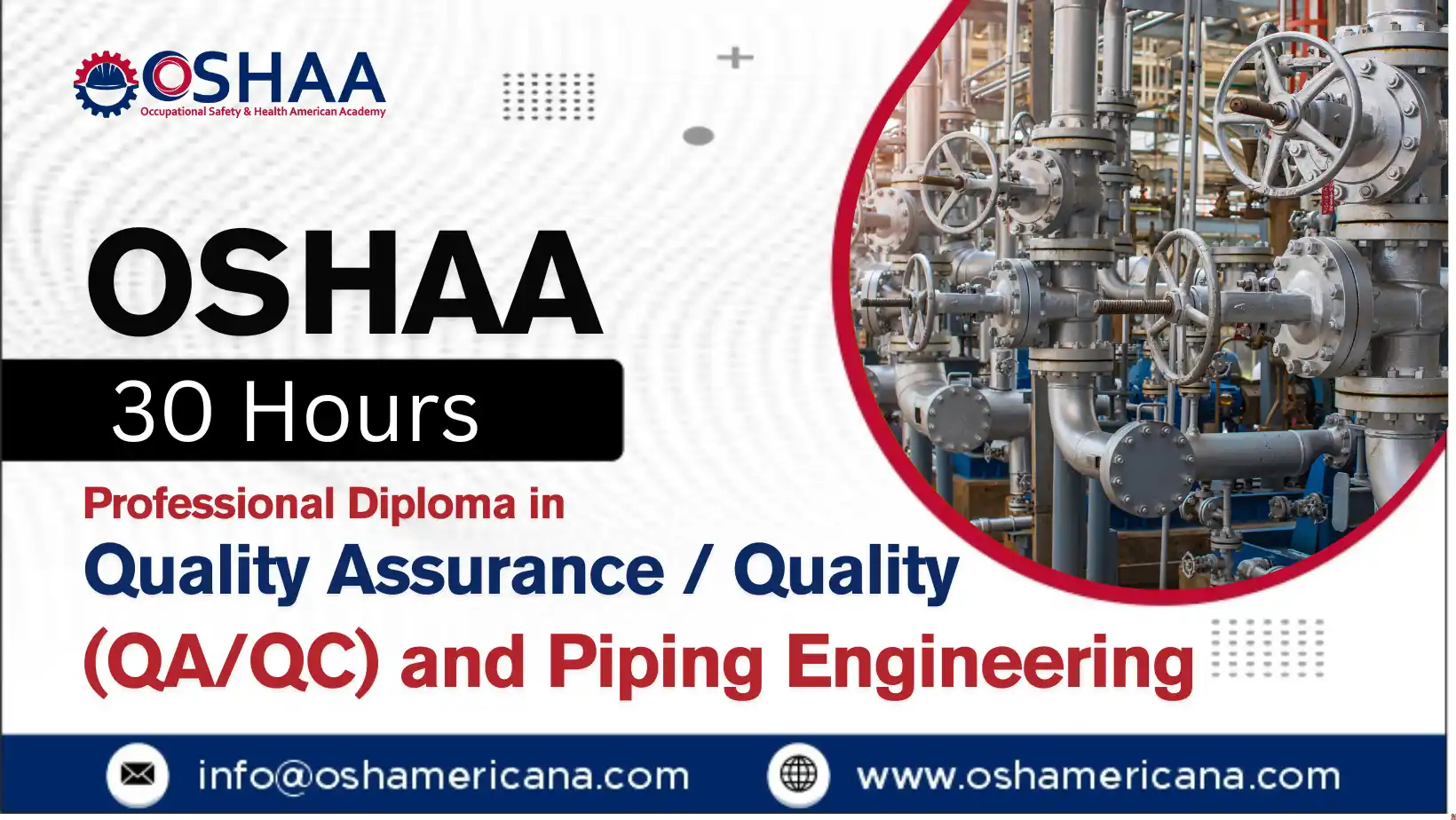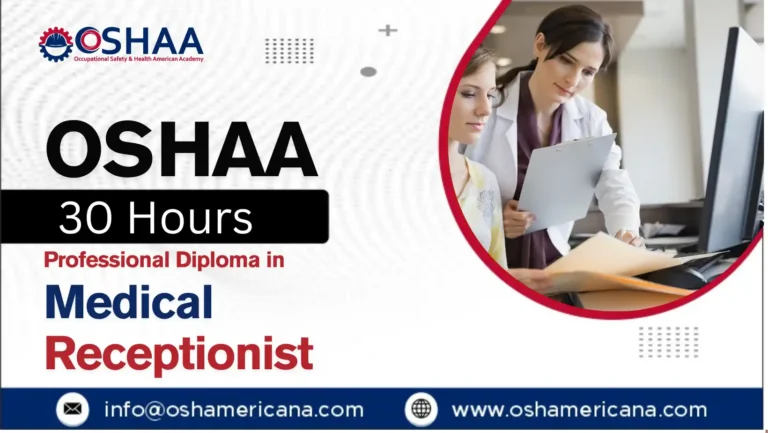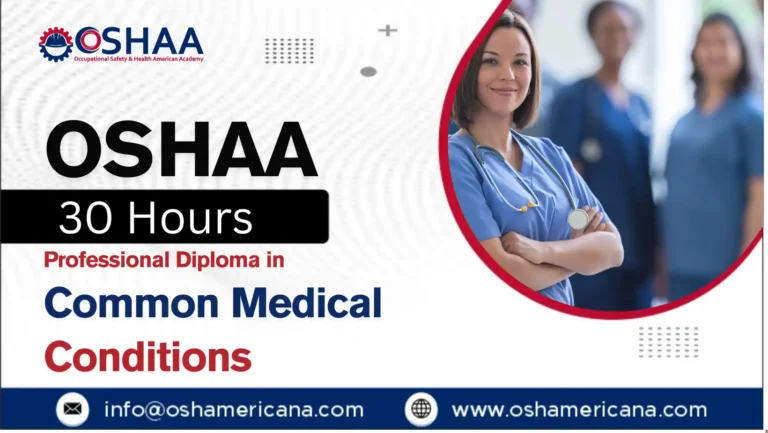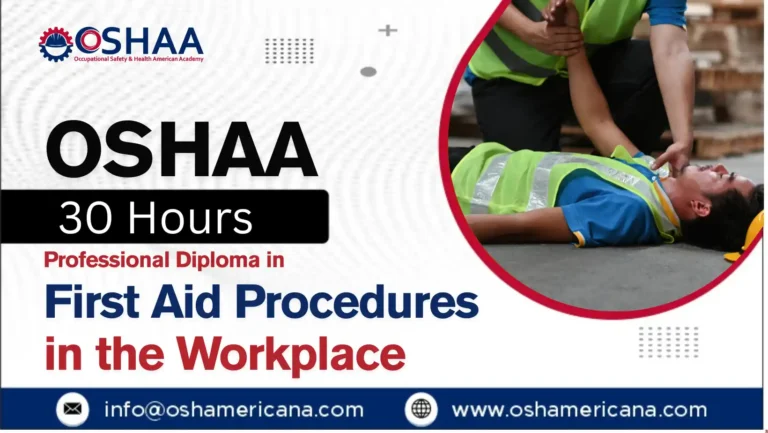Build Inspection and Engineering Skills with Diploma in QA/QC and Piping Engineering
The OSHAA 30-Hours Professional Diploma in Quality Assurance / Quality Control (QA/QC) and Piping Engineering is a specialised training programme designed to develop practical, industry-aligned competence in inspection and quality management. Awarded by OSHAA, this diploma aligns with recognised international standards and supports technical and supervisory roles across a range of industrial sectors.
The programme focuses on building essential skills in piping engineering, quality documentation, inspection planning, and compliance with widely used engineering codes and standards. Participants gain structured knowledge of piping materials, fabrication methods, welding processes, and quality control procedures used throughout project lifecycles.
Across the 30-hour curriculum, learners explore topics such as interpreting engineering drawings and piping isometrics, identifying fabrication and welding defects, understanding inspection requirements, and applying non-destructive testing principles. The course also introduces key quality documents, including welding procedures, qualification records, and inspection reports, providing practical insight into real-world QA/QC operations.
This diploma is suitable for both new entrants and experienced professionals seeking to strengthen their technical expertise. It is particularly relevant to industries such as oil and gas, petrochemicals, power generation, and industrial construction, where precision, safety, and regulatory compliance are essential.
OSHAA 30-Hours Professional Diploma in Quality Assurance / Quality Control (QA/QC) and Piping Engineering
Study Units
Learning Outcomes
Fundamentals of QA/QC in Piping Engineering (2 Hours)
• Understand the core principles and objectives of quality assurance and quality control
• Recognise the importance of QA/QC in piping-related industries
• Identify the roles and responsibilities of QA/QC professionals in project execution
Piping Materials, Components, and Manufacturing Processes (3 Hours)
• Identify common piping materials and their mechanical properties
• Understand the selection criteria for pipes, fittings, flanges, and valves
• Describe various manufacturing and fabrication processes used in piping systems
Welding Technology and Procedure Qualification (4 Hours)
• Explain different welding techniques applicable to piping systems
• Understand welding procedure specifications (WPS) and procedure qualification records (PQR)
• Identify welding symbols and interpret basic weld inspection results
International Codes and Standards: ASME, API, ISO (6 Hours)
• Interpret key international piping standards and codes
• Understand how ASME, API, and ISO standards apply to QA/QC practices
• Apply relevant codes to assess compliance during inspection and testing processes
Non-Destructive Testing (NDT): Methods and Applications (4 Hours)
• Identify various NDT techniques including VT, PT, MT, UT, and RT
• Understand the principles and applications of each NDT method
• Recognise how NDT supports piping system integrity and quality assurance
Interpretation of Piping Isometrics and Layout Drawings (3 Hours)
• Read and interpret piping isometric drawings and layout plans
• Extract essential inspection and verification information from drawings
• Validate piping installation against approved design specifications
Inspection and Test Plans (ITPs) in QA/QC Projects (3 Hours)
• Understand the structure and purpose of ITPs in piping projects
• Develop basic ITPs for piping fabrication and installation activities
• Monitor and document inspection stages in accordance with ITP requirements
Identification and Evaluation of Piping Defects (2 Hours)
• Identify common fabrication and welding defects in piping systems
• Understand causes, risks, and implications of piping defects
• Apply inspection findings to recommend corrective actions
Quality Documentation and Reporting in QA/QC
• Understand the role of WPS, PQR, and NDT reports in quality control
• Maintain accurate and traceable quality records
• Support audits and inspections through proper documentation practicesT Reports, and Records (3 Hours)
• Understand the purpose and contents of essential QA/QC documents
• Accurately review and interpret WPS, PQR, and NDT reports
• Maintain proper documentation and compliance records for audit and verification purposes
The OSHAA 30-Hours Professional Diploma in QA/QC and Piping Engineering offers a range of professional and practical benefits designed to enhance participants’ competence and career prospects in engineering and inspection roles:
• Develop a comprehensive understanding of QA/QC systems and their application in piping projects
• Gain practical knowledge of international codes and standards such as ASME, API, and ISO
• Build expertise in welding inspection, NDT techniques, and defect identification
• Learn to interpret technical drawings, isometrics, and prepare inspection and test plans (ITPs)
• Improve documentation skills with hands-on exposure to WPS, PQR, and compliance records
• Enhance technical communication and reporting capabilities essential for QA/QC professionals
• Prepare for roles in industries such as oil and gas, power plants, chemical facilities, and construction
• Align with global quality practices, ensuring readiness for local and international job opportunities
• Strengthen problem-solving and quality monitoring abilities in real-world project scenarios
• Earn a recognised certification from OSHAA, reflecting international occupational standards
This course is ideal for individuals aiming to build or advance a career in piping engineering and quality management within industrial and infrastructure sectors. It is specifically designed for:
• Participants seeking foundational and applied knowledge in QA/QC systems related to piping projects
• Engineering graduates or diploma holders aspiring to enter the oil and gas, petrochemical, or construction industries
• Participants already working in technical fields who wish to transition into QA/QC roles
• Quality inspectors, site supervisors, and fabrication personnel looking to strengthen their credentials
• Professionals aiming to understand international standards and compliance requirements in piping systems
• Participants preparing for global employment opportunities in quality control and assurance engineering roles
• Technicians and engineers interested in expanding their skills in inspection methods, documentation, and defect analysis
This course provides a well-rounded pathway for those seeking both practical competence and internationally aligned certification in QA/QC and piping engineering.







